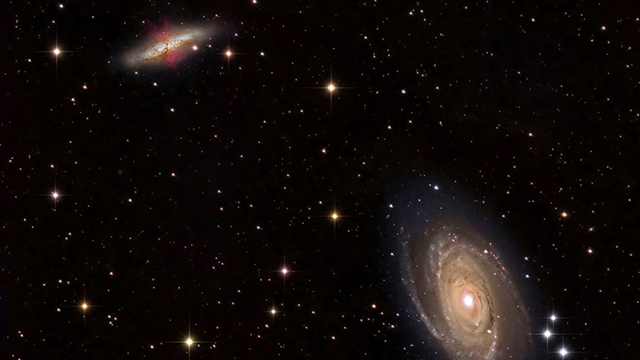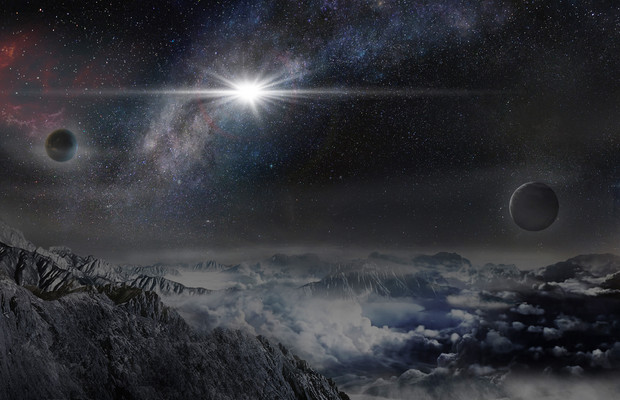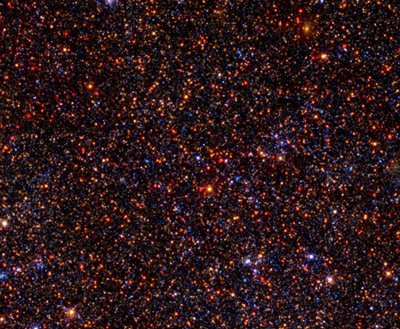搜索结果: 1-15 共查到“恒星与银河系 the Milky Way”相关记录33条 . 查询时间(0.046 秒)


Astronomers using the Atacama Large Millimeter/submillimeter Array (ALMA) have revealed an extremely distant and therefore very young galaxy that looks surprisingly like our Milky Way. The results are...

VLBA Measurement Promises Complete Picture of Milky Way(图)
VLBA Measurement Complete Picture Milky Way
2017/10/26
Astronomers using the National Science Foundation’s Very Long Baseline Array (VLBA) have directly measured the distance to a star-forming region on the opposite side of our Milky Way Galaxy from the S...

In a first-of-its-kind analysis, Northwestern University astrophysicists have discovered that, contrary to previously standard lore, up to half of the matter in our Milky Way galaxy may come from dist...
Milky Way-like Galaxies in Early Universe Embedded in 'Super Halos'
Milky Way-like Galaxies Early Universe Embedded Super Halos
2017/3/30
By harnessing the extreme sensitivity of the Atacama Large Millimeter/submillimeter Array (ALMA), astronomers have directly observed a pair of Milky Way-like galaxies seen when the universe was only e...
Astronomers observe early stages of Milky Way-like galaxies in distant universe
Astronomers early stages Milky Way-like galaxies distant universe
2017/3/30
For decades, astronomers have found distant galaxies by detecting the characteristic way their gas absorbs light from a bright quasar in the background. But efforts to observe the light emitted by the...
New delta Scuti:Rare pulsating star 7,000 light years away is 1 of only 7 in Milky Way
New delta Scuti pulsating star 7,000 light years 1 of only 7 Milky Way
2017/3/13
The star is one that pulsates and so is characterized by varying brightness over time. It’s situated 7,000 light years away from the Earth in the constellation Pegasus, said astronomer Farley Fer...
A better way to simulate accretion of the supermassive black hole at the center of the Milky Way is developed by PPPL and Princeton scientists
simulate accretion supermassive black hole Milky Way developed PPPL Princeton scientists
2017/1/9
Scientists at Princeton University and the U.S. Department of Energy’s (DOE) Princeton Plasma Physics Laboratory (PPPL) have developed a rigorous new method for modeling the accretion disk that feeds ...

What is 10 miles across,but powers an explosion brighter than the Milky Way?(图)
10 miles across explosion brighter the Milky Way
2016/1/22
Right now, astronomers are viewing a ball of hot gas billions of light years away that is radiating the energy of hundreds of billions of suns. At its heart is an object a little larger than 10 miles ...
Milky Way-Like Galaxies May Have Existed in the Early Universe
Milky Way-Like Galaxies Early Universe
2015/8/13
A new, large-scale computer simulation has shown for the first time that large disk galaxies, much like our own Milky Way, may have existed in the early days of the universe.

Study of Andromeda's stellar disk indicates more violent history than Milky Way(图)
Andromeda's stellar more violent history Milky Way
2015/1/20
A detailed study of the motions of different stellar populations in the disk of the Andromeda galaxy has found striking differences from our own Milky Way, suggesting a more violent history of mergers...

Distant Milky Way M Giants(图)
The Milky Way. Stars Distant Astrophysics. The telescope. Red dwarfs galaxy
2014/7/18
The distant outskirts of the Milky Way harbor valuable clues for understanding the formation and evolution of our Galaxy. Yet, due to overwhelming distances and an extremely sparse population of star...
Dark Matter distribution in the Milky Way: microlensing and dynamical constraints
Dark Matter distribution Milky Way microlensing dynamical constraints
2011/10/20
We show that current microlensing and dynamical observations of the Galaxy allow to set interesting constraints on the Dark Matter local density and profile slope towards the galactic centre. Assuming...
Reddening and metallicity maps of the Milky Way Bulge from VVV and 2MASS. I.The method and minor axis maps
Galaxy: bulge - ISM: dust, extinction - stars: abundances
2011/10/18
We present a method to obtain reddening maps and to trace structure and metallicity gradients of the bulge using data from the recently started ESO public survey Vista Variables in the Via Lactea (VVV...
We analyzed the distribution of the RC stars throughout Galactic bulge using 2MASS data. We mapped the position of the red clump in 1 sq.deg. size fields within the area |l|<=8.5deg and $3.5deg<=|b|<=...


